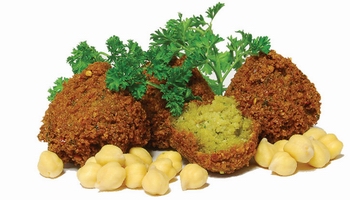|
Falafel is a deep-fried ball or patty made from
ground chickpeas, fava beans, or both. Falafel is a
traditional Middle Eastern food, commonly served in
a pita, which acts as a pocket, or wrapped in a
flatbread known as lafa; "falafel" also frequently
refers to a wrapped sandwich that is prepared in
this way.
The falafel balls are topped with salads, pickled
vegetables, hot sauce, and drizzled with tahini-based
sauces. Falafel balls may also be eaten alone as a
snack or served as part of a meze.
|
|
 |
Falafel is a common dish eaten throughout the Middle East.
The fritters are now found around the world as a replacement
for meat and as a form of street food.
Etymology
The word Falafil, which is the plural of Filfil, meaning
"pepper". The word itself, spread and being used by other
languages such as Persian pilpil from the Sanskrit word
pippalī, meaning "long pepper"; or an earlier *filfal, from
Aramaic pilpāl, "small round thing, peppercorn," derived
from palpēl, "to be round, roll". Thus in origin, falafel
would be "rollers, little balls."
A Coptic origin has recently been proposed via the
unattested phrase*pha la phel, meaning "of many beans".
The Arabic word falāfil has been globalized into many other
languages and spread around the rest of the world as the
general name for this food. In English, it is first attested
in 1941.
Falafel is known as taʿamiya in Egypt, with the
exception of Alexandria. The word is derived from a
diminutive form of the Arabic word; the particular form
indicates "a unit" of the given root in this case (ط ع م,
having to do with taste and food), thus meaning "a little
piece of food" or "small tasty thing".
The word falafel can refer to the fritters themselves or to
sandwiches filled with them.
History
The origin of falafel is unknown and controversial. A common
theory is that the dish originated in Egypt, possibly eaten
by Copts as a replacement for meat during Lent. As
Alexandria is a port city, it was possible to export the
dish and name to other areas in the Middle East. The dish
later migrated northwards to the Levant, where chickpeas
replaced the fava beans.It has been speculated that its
history may go back to Pharaonic Egypt. |



